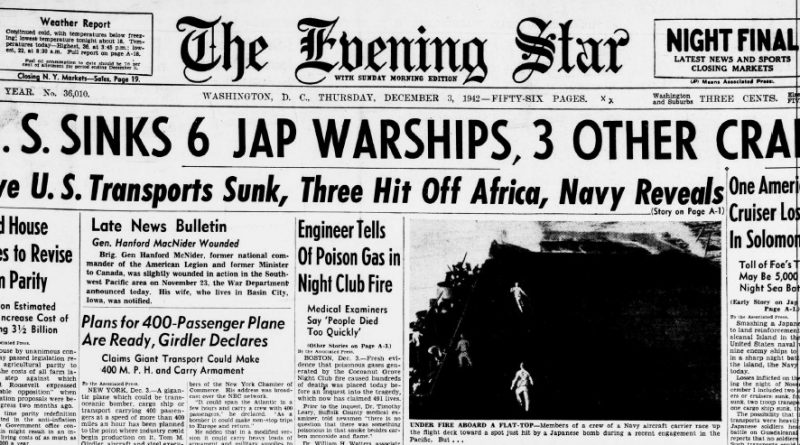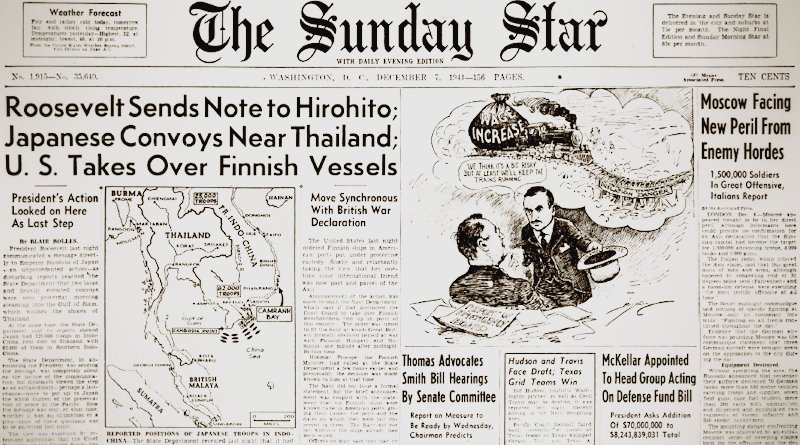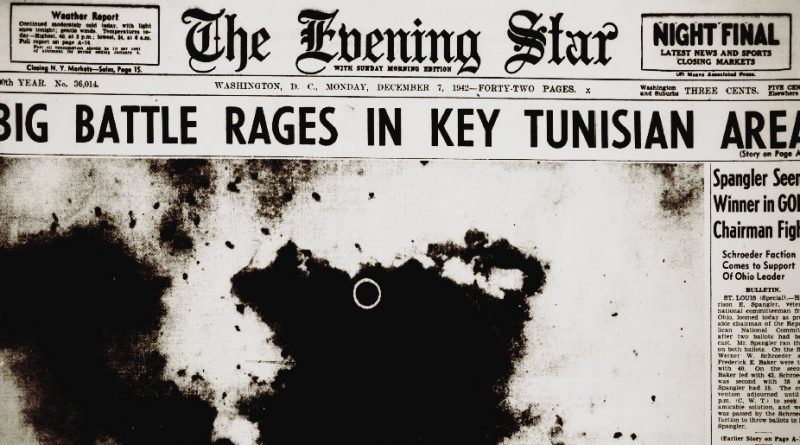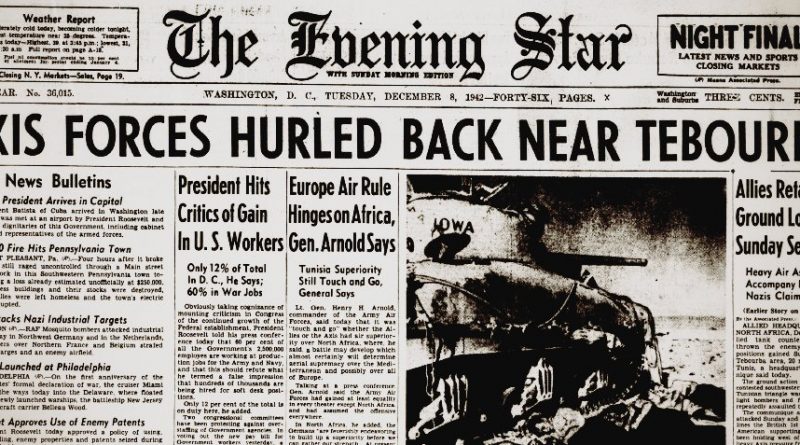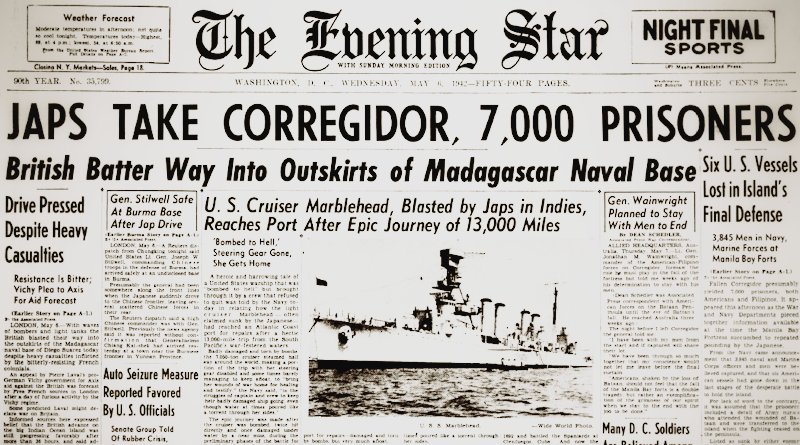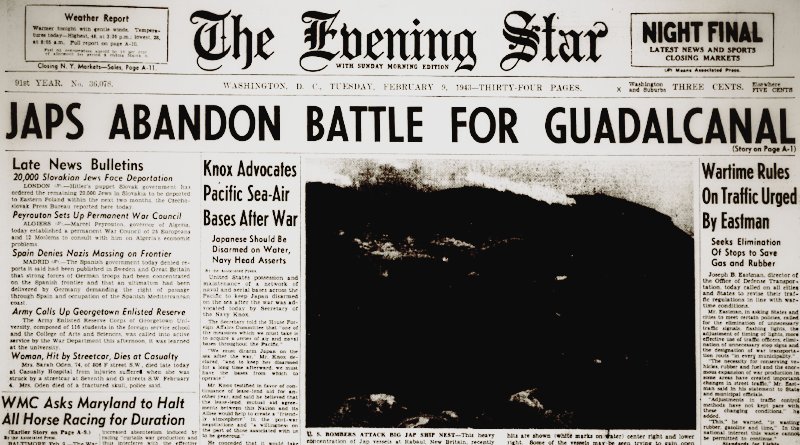World War II Chronicle: December 3, 1942
Click here for TODAY’S NEWSPAPER
Two Army Air Force pilots put their P-47 Thunderbolts into a test dive and reached 725 miles per hour according to a story on page four… A story on page five discusses the loss of five U.S. transports sunk by German U-boats during the North Africa campaign. Luftwaffe Ju 88 bombers attacked Leedstown and she was finished off on Nov. 8 by U-331 (59 Americans lost). U-173 sunk Joseph Hewes on Nov. 11 (100). U-130 sunk three ships on Nov. 12: Tasker H. Bliss (31), Hugh L. Scott (59), and Edward Rutledge (15)…
Crews are conducting a search for Lt. Col. Boyd D. “Buzz” Wagner who went missing on a routine flight from Eglin Field in Florida to Maxwell Field, Alabama (see page seven). Stay tuned for more on the missing ace… Sports section begins on page 46 and features a Grantland Rice column…
Roving Reporter by Ernie Pyle
WITH THE AMERICAN FORCES IN ALGIERS — Many of the red-tapish formalities that are common to the military are cast aside when the Army is in the field, moving relentlessly forward.
At an American airdrome where two of us correspondents went to arrange transportation farther east, a major said:
“Aw, to hell with your permits. I haven’t got the time to look at them. Just camp here in your bedrolls and I’ll put you on the first plane going your way.”
Many a good clerk in Washington would turn gray at such clerical simplicity.
I wish you could see this airdrome. It is far behind the fighting lines now, but still within reach of enemy bombers. Here you sense the pace of modern war.
It is an airdrome we captured from the French after hard fighting. It is in the flat desert country, with bare hills in the distance. Clouds of dust hang over it constantly, raised by the propellers of planes taking off and landing.
Fighters circle continuously overhead like protecting hawks. The sky is alive with work planes, rushing stuff to the front. They com singly and in vast formations. They land, load up, and take right off again.
Luxury liners that once carried you from coast to coast, now stripped down inside and painted olive drab, waddle off the ground with unbelievably big loads of soldiers, ammunition, supplies of all kinds.
The major said, “They’re getting off the ground thanks to those kid pilots and a slight surface wind. They’re terribly overloaded, but it’s necessary.”
The airdrome itself is a Hollywoodish scurry of activity. Jeeps dash around by the score. Great trucks haul their loads to the doors of planes. Ground crews live in ditches right alongside the runways. Officers throw their bedrolls onto the floor of a barracks building and just step across the road into the darkness for toilet purposes.
The officers are dirty, unshaven and tieless. You can hardly tell them from the privates.
Flat tires are patched right on the field. Great mounds of gasoline cans are stacked about the field. Protective revetments for fighter planes, made of adobe bricks, were built by the French before we came.
Around the edges of the field lie heaped-up wrecks of French and American planes shot down in the first few days of fighting. Old French planes line the field. You can see bullet holes in the walls of your barracks.
In town, life is not quite so urgent. The necessary office work of the Army seems about the same wherever it is done, and the Army is adept at setting up new headquarters in strange places.
Today, Oran is just as smoothly running an Army headquarters as any town in England or Ireland before the trek to Africa began. Hundreds of officers have already settled into a daily routine of working 12 hours or more at the office and going home to bed.
The Army has taken over several large hotels and office buildings. Officers are billeted in the hotels. Many of the troops are billeted in a big modern garage. Two officers’ messes have been set up, one at a hotel and one at a restaurant. They serve American food, brought in by convoy. For there is little food in this country. Our meals have been excellent, far better than civilians in England are used to.
Life here in town is on a rather ridiculous, half-normal, half-battle basis. I sleep in my bedroll on a hard stone floor, but I can have breakfast served grandly there in bed by a French waiter in a white coat!
I can have a luxurious hot bath, but I have to wash my own clothes. There is no soap except what we carry with us. Yet champagne is abundant and cheap.
There is little traffic in Oran except for hundreds of Jeeps and Army trucks. Soldiers on short leaves sit at sidewalk cafes sipping wine, while a few blocks away others lie wounded in hospitals.
Sentries guard all the buildings taken over by the army. You can telephone from one building to another, using the same secret code exchanges we used in England.
A press censorship office has been set up, and a base censor office for mail. Letters are already arriving from home.
The town as a whole has been turned back to the French, but the army keeps a hand raised and there will be no miscues.
Evening star. (Washington, D.C.), December 3, 1942. Chronicling America: Historic American Newspapers. Lib. of Congress.
https://chroniclingamerica.loc.gov/lccn/sn83045462/1942-12-03/ed-1/
